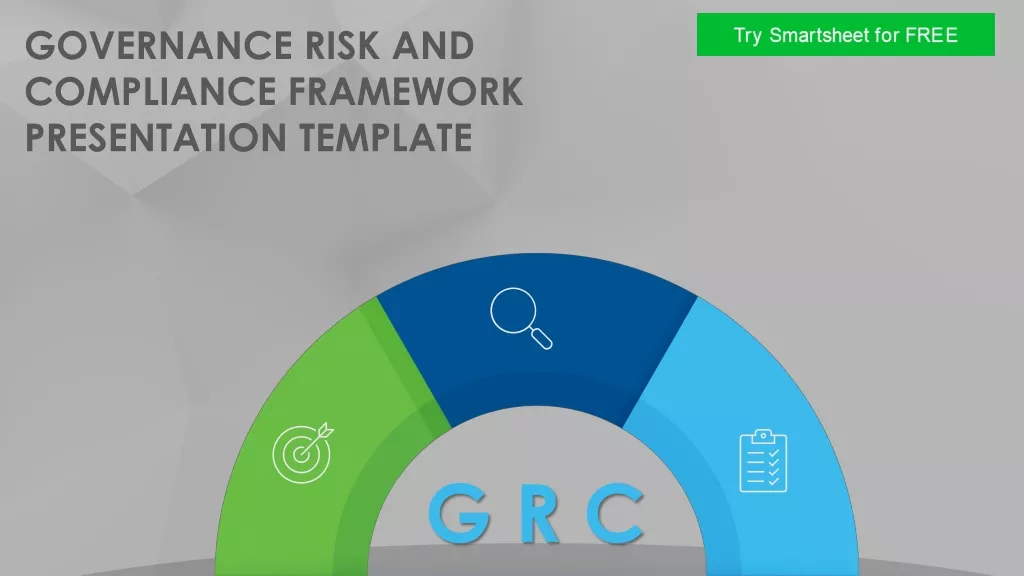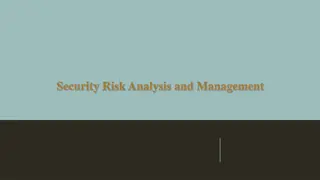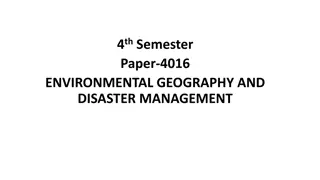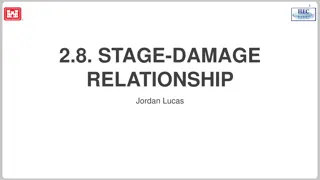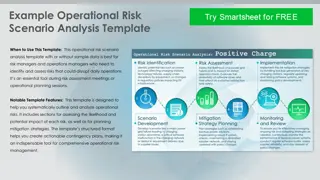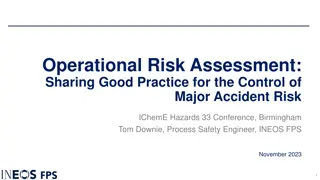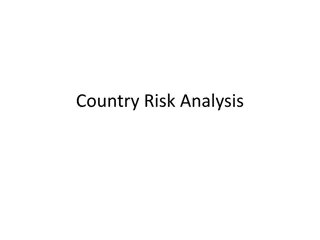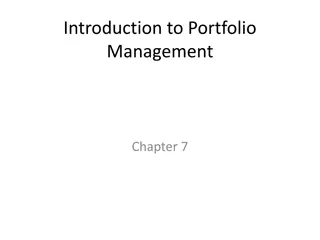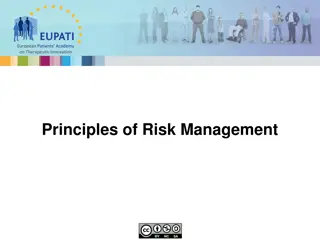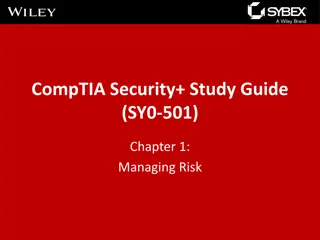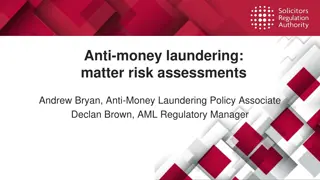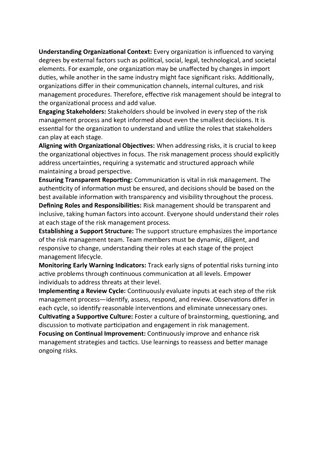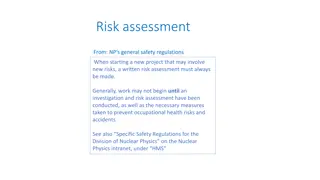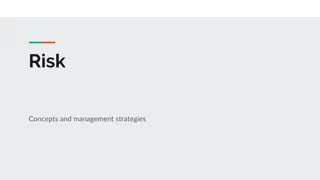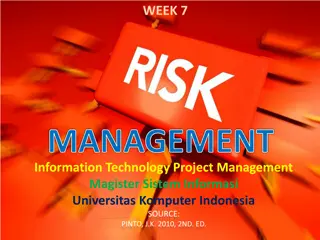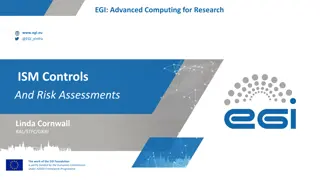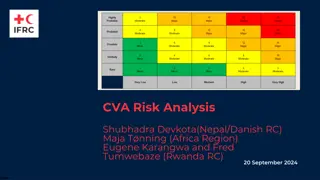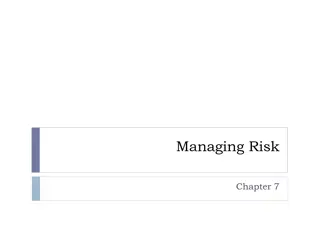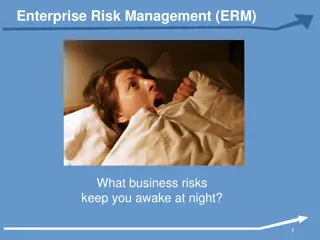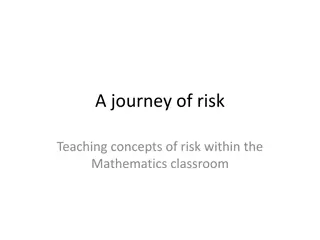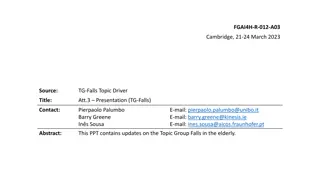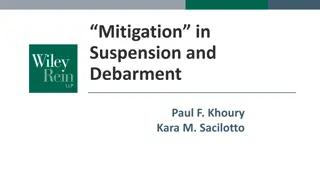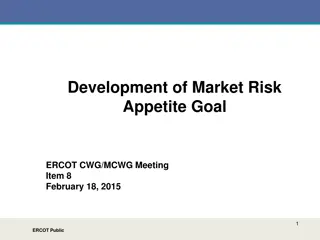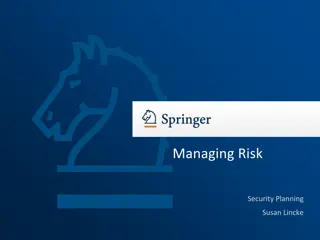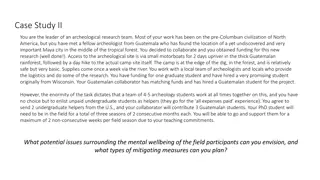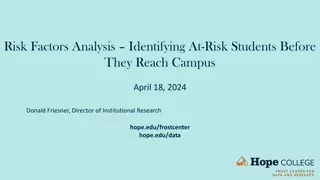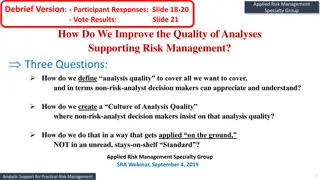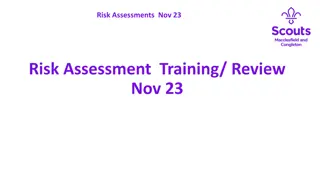Governance, Risk, and Compliance Framework in Business
Governance, Risk, and Compliance (GRC) are essential components of a robust business strategy. Governance focuses on aligning objectives with stakeholder expectations, Risk Management involves identifying and mitigating threats, and Compliance ensures adherence to regulations. By integrating GRC pri
0 views • 5 slides
Comprehensive Overview of Security Risk Analysis and Management
Explore the essential aspects of security risk analysis and management, including risk identification, assessment, and control techniques within an Information Security (InfoSec) context. Learn about the purpose of risk management, steps involved in a risk management plan, asset identification and c
0 views • 22 slides
Risk Management in Environmental Geography and Disaster Management
Risk management in environmental geography and disaster management involves assessing the potential losses from hazards, evaluating vulnerability and exposure, and implementing strategies to mitigate risks. It includes calculating risk, dealing with risk through acceptance, avoidance, reduction, or
2 views • 10 slides
Risk Factors in Building Asset Valuation and Damage Assessment
Explore various aspects of risk assessment in building asset valuation and damage prediction, covering topics such as stage-damage relationships, risk equations, sources of uncertainty, and first floor elevation considerations. Gain insights into the complexities of assessing and mitigating risks in
1 views • 24 slides
Introduction to Flood Risk Assessment with HEC-FDA Overview
This presentation delves into flood risk assessment using HEC-FDA software, covering topics such as defining flood risk, components of uncertainty, consequences of flood risk, and methods to assess flood risk including hydrology, hydraulics, geotechnical, and economics. It explores the intersection
7 views • 39 slides
Comprehensive Operational Risk Scenario Analysis Template
This template aids risk and operations managers in systematically identifying, assessing, and mitigating operational risks that could disrupt daily business operations. It allows for detailed risk analysis, scenario development, and mitigation strategy planning to ensure effective risk management. C
0 views • 4 slides
Operational Risk Assessment for Major Accident Control: Insights from IChemE Hazards 33 Conference
This content provides valuable insights into the importance of Operational Risk Assessment (ORA) in managing major accident risks in high hazard industries. It covers the necessity of ORA, identifying changes, risk assessment, and key success factors. Real-life examples like the Buncefield Terminal
1 views • 22 slides
Country Risk Analysis in International Business
Country risk analysis is crucial for multinational corporations (MNCs) to assess the potential impact of a country's environment on their financial outcomes. It includes evaluations of political and economic risks in foreign operations. Sovereign risk, political risk characteristics, and factors are
1 views • 61 slides
Enhancing Zoonotic Disease Risk Communication in Public Health Emergencies
Explore the significance of adopting a One Health approach to zoonotic disease risk assessment and communication in the context of emergency health situations. The session emphasizes core capacities required by the International Health Regulations (IHR) 2005, effective risk communication processes,
4 views • 13 slides
Project Risk Management Fundamentals: A Comprehensive Overview
Project risk management involves minimizing potential risks and maximizing opportunities through processes such as risk management planning, risk identification, qualitative and quantitative risk analysis, risk response planning, and risk monitoring and control. Quantitative risk analysis assesses t
0 views • 41 slides
Fundamentals of Portfolio Management and Risk Aversion in Investing
Portfolio theory is based on the principles of maximizing returns for a given risk level, considering all assets owned. Investors typically exhibit risk aversion, preferring lower risk assets for similar returns. Risk is defined as future outcome uncertainty. Markowitz Portfolio Theory highlights th
2 views • 17 slides
Principles of Risk Management in Therapeutic Innovation
European Patients Academy emphasizes the importance of risk management in therapeutic innovation. Understanding the balance between benefits and risks, implementing risk management strategies for all medicines, and identifying different types of risks are crucial for ensuring patient safety and publ
1 views • 13 slides
Risk Management Strategies in Organizational Security
Exploring risk management in organizational security, this study guide delves into resiliency, automation strategies, policies, and procedures to reduce risk. It covers threat assessments, computing risk assessments, qualitative vs. quantitative risk measurements, and actions based on risk assessmen
2 views • 19 slides
AML Risk Assessments and Due Diligence Regulations
Anti-money laundering (AML) risk assessments and due diligence regulations are crucial for preventing money laundering and terrorist financing. This content discusses the importance of risk assessments, client due diligence, and regulatory compliance in the AML landscape. It emphasizes the need for
1 views • 13 slides
Essential Principles for Effective Risk Management
Risk management involves minimizing or mitigating risks that arise from uncertainty. In organizations, this uncertainty often stems from the marketplace. Ideally, risk management follows a prioritization process, addressing risks that pose the greate
3 views • 1 slides
Comprehensive Overview of Cyber Risk Management and Cyber Insurance Strategies
This content provides insights into Cyber Risk Management and Cyber Insurance, emphasizing the importance of adopting a risk-based strategy. It covers elements such as identifying scenarios, defining impact, evaluating insurance positions, and mitigating costs. The integrated approach towards contin
0 views • 6 slides
Wildfire Risk Mitigation Among Private Landowners
Activities involving fuel reduction and defensible space are crucial among private landowners for mitigating wildfire risks. Factors influencing mitigation behavior include wildfire hazard, past experiences, perceived risk, and social context. Information from local government agencies and fire awar
3 views • 15 slides
Risk Assessment Guidelines and Procedures for NP Projects
Guidelines and procedures for conducting risk assessments in Nuclear Physics projects are outlined, emphasizing the importance of assessing and mitigating occupational hazards before work commencement. Detailed instructions on when, how, and by whom risk assessments should be carried out are provide
0 views • 5 slides
Risk Concepts and Management Strategies in Finance
Explore the essential concepts of risk in finance, such as risk definition, risk profiles, financial exposure, and types of financial risks. Learn about risk vs. reward trade-offs, identifying risk profiles, and tools to control financial risk. Understand the balance between risk and return, and the
0 views • 18 slides
Risk Management in Information Technology Project
Project risk is any potential event that can harm a project's success. Risk management involves identifying, analyzing, and responding to risks throughout the project's lifecycle to safeguard its objectives. The process includes risk identification, analysis of probability and consequences, risk mit
0 views • 16 slides
Risk and Return Assessment in Financial Management
This comprehensive presentation explores the intricacies of risk and return assessment in the realm of financial management. Delve into understanding risk concepts, measuring risk and return, major risk categories, and the impact of risk aversion on investment decisions. Gain insights into the manag
1 views • 62 slides
Risk Management and Security Controls in Research Computing
The European Grid Infrastructure (EGI) Foundation conducts risk assessments and implements security controls in collaboration with the EOSC-hub project. The risk assessments involve evaluating threats, determining likelihood and impact, and recommending treatment for high-risk threats. Results from
1 views • 13 slides
Risk Management & MPTF Portfolio Analysis at Programme Level for UN Somalia
This session delves into the world of risk management and portfolio analysis at the programme/project level, specifically focusing on the Risk Management Unit of the United Nations Somalia. It covers enterprise risk management standards, planned risk management actions, the role of RMU, joint risk m
0 views • 30 slides
Comprehensive CVA Risk Analysis and Management Overview
This detailed document delves into the importance of CVA Risk Analysis, introducing the CVA risk register and outlining the identification, mitigation, and management of risks. It emphasizes understanding root causes and gaining confidence in filling the Risk Register. Additionally, it discusses the
0 views • 12 slides
Managing Project Risk to Reduce Construction Claims
Construction projects face risks such as escalating costs, incomplete plans, and design issues. Managing project risk is crucial to avoid adverse impacts and maximize opportunities for successful project outcomes. This presentation by Laurie Dennis covers the definition of project risk, importance o
0 views • 26 slides
Alcohol and Cancer Risk: Understanding the Links
Alcohol consumption is linked to an increased risk of various cancers, including mouth, throat, esophagus, breast, liver, and colorectal cancers. Factors such as ethanol, acetaldehyde, nutrient absorption, estrogen levels, and liver cirrhosis play a role in this risk. Even light drinking can elevate
0 views • 17 slides
Recurring Issues Impacting Risk Management in Construction Industry
Explore recurring issues affecting risk management in the construction industry, including contractual risk allocations, common risks to monitor, and case studies like the Statute of Repose scenario. Learn about risk allocation through contract clauses and how legal doctrines play a role in mitigati
0 views • 43 slides
Comprehensive Guide to Risk Management Processes
Explore the essential aspects of risk management in Chapter 7, covering the risk management process, benefits, risk event graph, and step-by-step procedures for risk identification and assessment. Learn how proactive risk management reduces surprises, enhances control, and improves project performan
1 views • 38 slides
Enterprise Risk Management (ERM) Strategies for Mitigating Key Business Risks
Enterprise Risk Management (ERM) is a crucial strategic discipline that involves prospectively identifying, managing, and mitigating risks to reduce uncertainties and ensure organizational objectives are met. Risk rankings, mitigation strategies, and lead roles are outlined in the SJIEMS 2017 ERM Re
0 views • 38 slides
Risk Concepts in the Mathematics Classroom
Risk is a concept integral to decision-making in various aspects of life. This resource explores how risk is defined in the real world, its relevance in the classroom, and strategies for teaching risk literacy to students. It delves into the multiple definitions of risk, risk analysis, and the emoti
0 views • 62 slides
Risk Analysis in Environmental Management: A Comprehensive Overview
Risk analysis plays a crucial role in environmental management, particularly in assessing potential health hazards and managing associated risks. This process involves risk assessment and risk management, with steps such as hazard identification, exposure assessment, dose-response assessment, and ri
0 views • 27 slides
Advances in Fall Risk Assessment and Management for Older Adults
This presentation delves into updates on the stratification tool for fall risk in community-dwelling older adults, emphasizing the importance of early intervention through opportunistic health visits. It discusses a decision tree model for assessing fall risk, highlighting the significance of histor
1 views • 12 slides
Mitigation in Suspension and Debarment Procedures
Delve into the significance of mitigating factors in Suspension and Debarment cases under the FAR and NCR regulations. Explore how these factors impact decision-making by debarring officials and the statistics surrounding suspension/debarment actions. Discover the parallels between FAR mitigating fa
0 views • 24 slides
Organizational Risk Appetite and Tolerance
Explore the development of market risk appetite goals and how to define and establish organizational risk tolerance. Learn about the Classic Simplified View of Risk Tolerance and different methods to determine risk appetite. Discover the importance of assessing market risk impact and aligning risk t
0 views • 8 slides
Developing a Risk Appetite Culture: Importance and Framework
Risk management plays a critical role in the success of corporations, with strategy and risk being intertwined. This presentation delves into definitions of key terms such as risk appetite, the Risk Appetite Cycle, characteristics of a well-defined risk appetite, and the importance of expressing ris
0 views • 31 slides
Security Planning and Risk Management Overview
This content provides an in-depth exploration of managing risk, security planning, and risk appetite in the context of cybersecurity. It covers essential concepts such as risk management process, threat types, risk analysis strategies, vulnerability assessment, and risk mitigation techniques. The ma
1 views • 73 slides
Challenges and Mitigating Measures for Archeological Research Team in Guatemalan Rainforest
Leading an archeological research team in a remote Maya city in the Guatemalan rainforest poses mental well-being challenges. Factors such as isolation, basic camp conditions, extended fieldwork, cultural differences, and language barriers can impact the participants. Mitigating measures include pro
0 views • 6 slides
Risk Factors Analysis: Identifying At-Risk Students Before They Reach Campus
Risk Factors Analysis aims to identify students at risk of attrition before they even arrive on campus by evaluating academic, financial, minority, and first-generation factors. The method involves choosing specific risk factors, tracking historical prevalence, calculating relative risk, and predict
0 views • 15 slides
Enhancing Risk Analysis Quality for Effective Decision-Making
This content delves into improving the quality of analyses supporting risk management, emphasizing the importance of defining analysis quality comprehensively for decision makers, fostering a culture of analysis quality, and ensuring practical application on the ground. The Applied Risk Management S
0 views • 27 slides
Comprehensive Risk Assessment Training Overview
In this risk assessment training session held on November 23, participants reviewed the process of writing and reviewing risk assessments to enhance the quality of assessments for safer scouting experiences. The training aimed to improve leaders' skills and confidence in risk assessment practices wh
0 views • 37 slides
